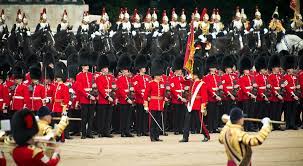15 September 2022
Misunderstanding Devil-Land
Views from abroad.
By Neil Tidmarsh

“I heard the chief monarch of a thieving raping genocidal empire is finally dying. May her pain be excruciating.”
Well, everyone’s entitled to an opinion. But we might have expected a better-informed and more intelligent one from an academic, a professor at Pittsburgh’s Carnegie Mellon University. As Rod Liddle wrote in The Sunday Times, “What shocks is not the vileness and hatred. It is the ignorance. What is a ‘chief’ monarch? And is she not aware that it was the Queen who ushered out our empire?” In Tuesday’s The Times, Hugo Rifkind made a similar point about the myopic reaction of the professor and of other ‘liberal’ academics and journalists in the US; “Decolonising the discourse? The Queen decolonised the actual colonies!”
Perhaps the professor, peering across the Atlantic from Pittsburgh, saw no further than the scarlet uniforms, the gold braid, the horses, the carriages and the castles, and assumed that nothing had changed over the last seven decades, that here is a country which turned into a fossil a good few centuries ago. It’s a shame she couldn’t see past the traditional pageantry to perceive the massive changes which have taken place in this country since 1952. Then, in the spirit of academic enquiry, she could have asked herself “how can a country wedded to historic pageantry and ancient tradition centred on the medieval institution of monarchy, also still manage to modernise itself, to reject empire, relax its stiff social conventions, embrace multi-culturalism and diversity and innovate in the arts, science and technology?” Then she might even have grasped the startling and equally paradoxical explanation for that apparent contradiction; “The UK manages to accommodate change and evolve peacefully precisely because it still maintains historic pageantry, ancient tradition and an inherited head of state!”
Many in the UK take pride in the simple fact that the country can still stage ancient, visually impressive and logistically demanding pageantry; precisely choreographed ceremony, beautifully drilled soldiery in sparkling and spotless uniforms, etc. But to value such traditions just for themselves, just for their simple survival, is to miss the real point – that they have a very practical purpose, even (or especially) in today’s world.
Two practical purposes, in fact. Internal and external. The first is to take the sting of anxiety out of the prospect of change. If a reassuring back-drop of continuity can be maintained, then change becomes less frightening and easier to accept. You can be much more comfortable with the future if you can see it being stitched into the past. The huge changes which took place in this country over the last seventy years could well have provoked violent reaction, massive social unrest, even coup d’états and revolutions in other times and other places; but the sense of continuity afforded by the queen and her royal trappings (recognised as more-than-symbolic guarantors of unity and stability by most of her subjects) no doubt did much to neutralise such dangers.
Second, the maintenance of pageantry and tradition is a performance to persuade our friends abroad that we’re still stable and therefore reliable in spite of the tricky internal changes and evolutions we’re trying to cope with. At the same time it can be a smokescreen to fool our enemies abroad into thinking that we’re stable and strong and unchanging, even while the processes of internal change are disturbing our balance and making us vulnerable. The smokescreen appears to have worked only too well where Pittsburgh’s professor is concerned – perhaps we should feel flattered that she thinks we’re still an imperial power.
The professor’s comment could itself be part of a tradition; a tradition going back more than four centuries and revealed in the recent best-seller Devil-Land, Clare Jackson’s ground-breaking history of England’s most formative century, 1588-1688 – the revolutionary century which put the country on the path to constitutional monarchy and Elizabeth II. The novelty of Clare Jackson’s work is that it tells the story largely from the outside, in the words of seventeenth-century foreign observers such as diplomats, royalty, politicians, scholars and other visitors from abroad during that time.
Many of these observers considered England to be ‘a violent and anarchic land of devils, almost a failed state’ and their opinions have been taken at face value by most of the book’s reviewers, encouraged perhaps by the publisher’s marketing department and publicists who seem to be pushing a knowing, post-Brexit plus ça change angle. But what in fact emerges from a more forensic reading is that those foreign diplomats, scholars, visiting princes etc almost always got it wrong. They’re frequently mistaken in their opinions and interpretations. They invariably pick up the wrong end of the stick. Time after time they simply fail to understand what is going on around them. Which is hardly surprising, considering that England was evolving, politically and socially, at such a break-neck speed at this time, far ahead of its neighbours.
Two good examples. First, foreign opinion was appalled by the execution of Mary Queen of Scots. What really outraged diplomats and foreign royals was that parliament had the shameful temerity to subject a monarch to the humiliating process of the law – a public trial and a public execution. What really puzzled them was why on earth hadn’t Elizabeth simply had Mary secretly murdered and then put out some plausible lie about her death? Second, foreign dignitaries in London were appalled that the boatmen who ferried them across the Thames wanted to talk politics with them. Surely common people shouldn’t be allowed to concern themselves with the exclusive business of royalty and aristocracy? These observers missed these signs that England was speeding towards such modern concepts as equality before the law, freedom of speech and democratic government. Instead, they were convinced that such instances were proof that England was going to the dogs.
Clare Jackson concludes her book with the words of the Abbé Prévost, a former Benedictine monk who moved from France to London in 1728, when constitutional monarchy had finally been established and the aim and direction of the previous century’s struggles were becoming clearer with hindsight. ‘He believed that the English were unfairly judged by foreigners “on the basis of what was assumed about a violent history”.’ Perhaps the professor from Pittsburgh will reach the same conclusion after cooler and more rational consideration.


